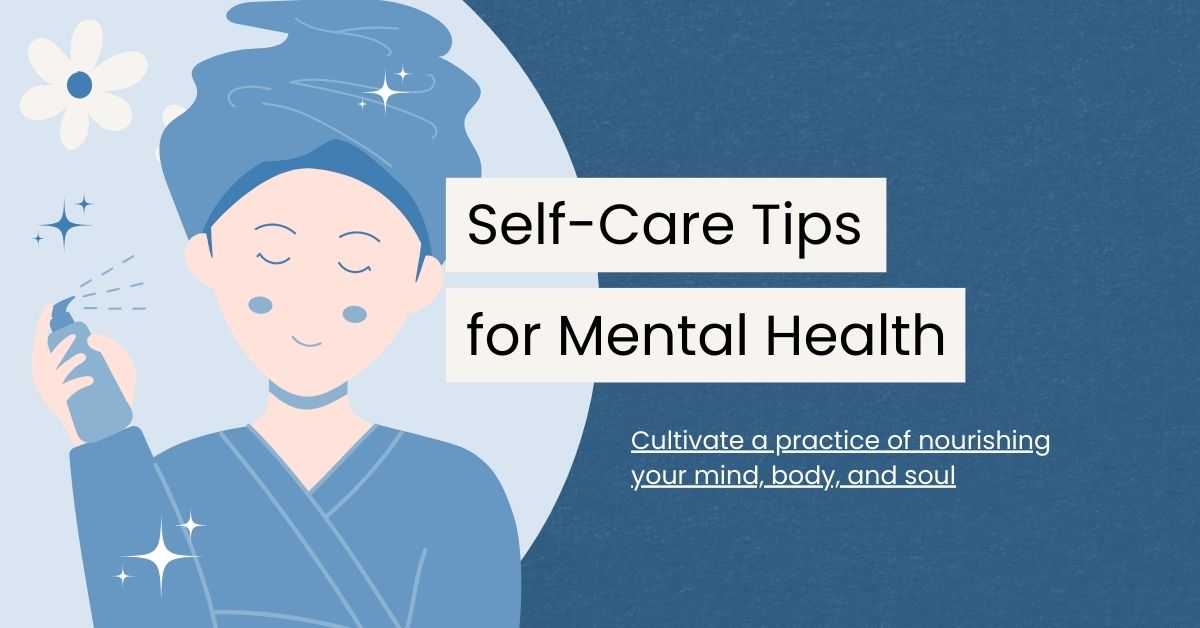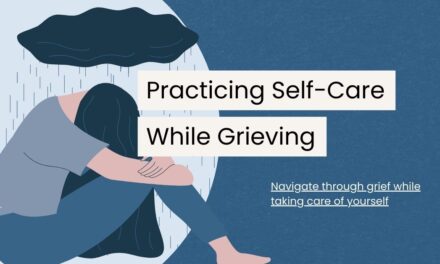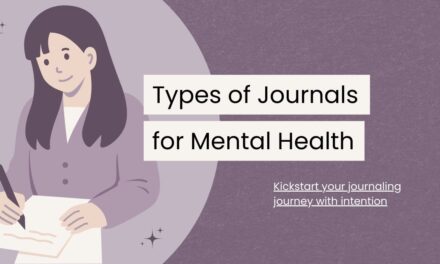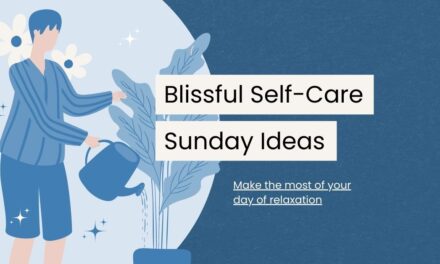Last Updated on August 1, 2023
Life can be a rollercoaster of emotions, and let’s be honest; it’s not always sunshine and rainbows. We all have those moments when we feel like we’re barely holding it together, juggling countless responsibilities while trying to keep our mental health intact. But amidst the chaos, have you ever found yourself wondering, “When was the last time I took care of myself?”
You see, self-care isn’t just about pampering yourself with occasional indulgences (though that can be wonderful too!). It’s about cultivating a daily practice of nourishing your mind, body, and soul. It’s about taking a step back from the chaos and embracing moments of solitude to reconnect with yourself. It’s about recognizing your limits and learning to say no without guilt. It’s about making your mental well-being a priority, just as you would with your physical health.
So, let’s embark on a journey together—one that empowers you to embrace self-care, nurture your mental health, and create a life that feels genuinely fulfilling. In this article, we’ve curated 10 essential self-care tips for mental health that will not only enhance your well-being but also empower you to navigate life’s challenges with grace and resilience.
The Best Self Care Tips for Mental Health
Tip #1: Practice Mindfulness
Amidst the hustle and bustle, take a moment to pause and breathe. Mindfulness is the art of being present in the now, and it can work wonders for your mental health. When we practice mindfulness, we cultivate awareness of our thoughts, feelings, and sensations without judgment. Here’s how to get started:
- Mindful Breathing: Find a quiet space, sit comfortably, and focus on your breath. Take slow, deep breaths, and notice how the air feels as it enters and leaves your body. If your mind starts to wander, gently bring your attention back to your breath.
- Body Scan: Lie down or sit in a comfortable position. Slowly scan your body from head to toe, noticing any areas of tension or discomfort. Take deep breaths and allow yourself to release any physical tension as you exhale.
- Mindful Eating: Pay attention to each bite during your meals. Savor the flavors, textures, and smells of your food. Eating mindfully helps you fully experience your meal and can prevent overeating.
Remember, mindfulness is not about silencing your thoughts or achieving a perfect state of serenity. It’s about accepting whatever arises in the present moment with kindness and curiosity. By incorporating mindfulness into your daily routine, you can reduce stress, improve focus, and cultivate a greater sense of peace and contentment in your life.
Tip #2: Get Quality Sleep
Another one of the best self-care tips for mental health is to get an adequate amount of sleep daily. Make it a priority to get those 7-9 hours of restful sleep each night. Adequate sleep is essential for your brain to recharge, process emotions, and consolidate memories. Here’s how to improve the quality of your sleep:
- Set a Consistent Sleep Schedule: Try to go to bed and wake up at the same time every day, even on weekends. This helps regulate your body’s internal clock and improves the overall quality of your sleep.
- Establish a Bedtime Routine: Develop a soothing pre-sleep routine to signal to your body that it’s time to wind down. This could include activities like taking a warm bath, practicing light stretching, or doing some gentle meditation.
- Manage Stress and Worries: If your mind races with worries at night, try writing them down in a journal before bedtime. This can help you release those thoughts and clear your mind.
By making these adjustments to your sleep habits and environment, you’ll give your body the rest it needs to function optimally during the day. Remember, quality sleep not only supports your mental health but also enhances your overall well-being. Prioritize sleep, and you’ll wake up refreshed and ready to tackle whatever challenges the day brings!
Tip #3: Stay Active and Exercise Regularly
Move that body! Physical activity releases endorphins, the happiness hormones that can lift your mood and reduce stress. Incorporating regular exercise into your routine not only benefits your physical health but also has a profound impact on your mental well-being. Here’s how to make exercise a part of your daily life:
- Find an Exercise You Enjoy: The key to sticking with a fitness routine is to choose activities that you genuinely enjoy. Whether it’s dancing, hiking, swimming, yoga, or hitting the gym, find something that brings you joy and makes you look forward to moving your body.
- Start Small and Gradually Increase: If you’re new to exercise, start with manageable activities and gradually increase the intensity and duration over time. Don’t feel pressured to tackle a marathon on your first day; even a short walk can be a great starting point.
- Embrace the Outdoors: If possible, take your workouts outside. Exercising in nature has added benefits, such as reducing stress, improving focus, and boosting your mood.
- Celebrate Your Progress: Acknowledge and celebrate your exercise achievements, no matter how small they may seem. Every step you take toward a healthier lifestyle is worth celebrating.
Remember, exercise is not just about achieving a certain physique; it’s about nurturing your mental health and finding joy in movement. So, lace up those sneakers, dance like nobody’s watching, and let physical activity become a source of empowerment and happiness in your life! Your mind and body will thank you for it. 🏃♀️🏋️♂️
Tip #4: Connect with Supportive Relationships
We’re social creatures, and connections with others are vital for our mental well-being. Building and nurturing meaningful relationships with friends, family, or support groups can provide a sense of belonging, emotional support, and a safe space to express ourselves. Here’s how to cultivate and maintain supportive relationships:
- Practice Active Listening: Truly listening to others is a powerful way to show that you care. Practice active listening by giving your full attention, maintaining eye contact, and providing verbal cues to show you understand and empathize.
- Offer Support and Encouragement: Be a source of support for your loved ones during both good times and challenging moments. Offer encouragement, lend a helping hand, or simply be a listening ear when they need to talk.
- Express Gratitude: Show appreciation for the people who bring positivity into your life. A simple “thank you” or a heartfelt note can go a long way in reinforcing the bonds of your relationships.
Building and nurturing supportive relationships is an ongoing process that requires time and effort, but the rewards are immeasurable. By surrounding yourself with a network of caring individuals, you create a strong foundation of emotional well-being and a sense of community. So, reach out, connect, and cherish the relationships that enrich your life! ❤️
Tip #5: Set Boundaries and Learn to Say No
It’s okay to put yourself first and say no to things that overwhelm you. Setting healthy boundaries in both your personal and professional life is essential for maintaining your mental well-being and avoiding burnout. Here’s how to establish and communicate boundaries effectively:
- Identify Your Limits: Take some time to reflect on your needs, priorities, and emotional capacity. Understand what activities or situations drain your energy and leave you feeling overwhelmed.
- Practice Self-Awareness: Be attuned to your emotions and physical sensations. If you notice signs of stress or discomfort, it may be an indication that your boundaries have been crossed.
- Communicate Clearly: When setting boundaries, be clear and assertive in expressing your needs and limitations. You don’t need to justify or apologize for prioritizing your well-being.
- Start Small: If you’re not used to setting boundaries, begin with smaller situations and work your way up to more significant challenges. Practice makes perfect, and each step counts towards preserving your mental energy.
By setting boundaries and learning to say no, you’re creating a protective shield around your mental and emotional health. Remember that you have the right to prioritize yourself and your well-being without feeling guilty.
Tip #6: Engage in Hobbies and Activities You Enjoy
What brings you joy? Whether it’s painting, cooking, or playing an instrument, make time for activities that make your heart sing. Engaging in hobbies and activities you love isn’t just a luxury; it’s a powerful way to reduce stress and improve your mental well-being. Here’s how to prioritize and embrace the things that light up your soul:
- Explore Your Passions: Take some time to explore what truly brings you joy. Reflect on activities that you loved as a child or those that make you lose track of time as an adult.
- Mindful Creativity: Engage in your hobbies with mindfulness, fully immersing yourself in the activity. It can become a form of meditation, promoting a sense of calm and focus.
- Discover Therapeutic Hobbies: Some hobbies, such as gardening, journaling, or yoga, have therapeutic benefits and can serve as outlets for processing emotions and relieving stress.
Remember, indulging in activities you love is not a luxury; it’s a necessity for your mental health and overall happiness. Whether it’s creating art, playing a sport, or immersing yourself in nature, these moments of joy recharge your spirit and help you navigate life’s challenges with renewed vigor.
Tip #7: Limit Screen Time and Digital Detox
Social media and constant screen exposure can be overwhelming. Take regular breaks from technology, disconnect, and savor moments of solitude to recharge your mind. Here’s how to find a healthy balance with technology and embrace the benefits of a digital detox:
- Set Boundaries with Technology: Establish specific times during the day when you’ll limit screen time. For example, avoid screens during meals or an hour before bedtime.
- Embrace Nature and Outdoor Activities: Spend time in nature or engage in outdoor activities that don’t involve screens. Nature has a calming effect on the mind and can help you feel more grounded and connected.
- Engage in Screen-Free Hobbies: Discover hobbies that don’t involve screens, such as painting, journaling, or playing a musical instrument. These activities can be incredibly therapeutic and fulfilling.
Remember, technology is a valuable tool, but it’s essential to use it mindfully and create space for real-life experiences. By taking regular breaks from screens and finding moments of digital detox, you can nurture your mental well-being and cultivate a healthier relationship with technology.
Tip #8: Practice Gratitude and Positive Thinking
Shift your focus to the good stuff. Cultivate a gratitude practice by jotting down things you’re thankful for each day. Embrace positive thinking and reframe negative thoughts to foster a more optimistic outlook. Here’s how to infuse your life with gratitude and positivity:
- Start a Gratitude Journal: Each day, write down three things you’re grateful for. This practice shifts your focus to the positive aspects of your life and promotes feelings of contentment.
- Practice Positive Affirmations: Replace self-doubt with positive affirmations. Remind yourself of your strengths, capabilities, and the things that make you unique.
- Reframe Negative Thoughts: When negative thoughts arise, challenge them with positive alternatives. For example, if you catch yourself thinking, “I can’t do this,” reframe it as, “I’m capable and can handle this challenge.”
Cultivating gratitude and positive thinking can transform your outlook on life. By focusing on the good in your life and reframing negative thoughts, you’ll develop a more resilient and optimistic mindset.
Tip #9: Seek Professional Help and Support
Remember, asking for help is a sign of strength, not weakness. If you’re struggling, reach out to a mental health professional who can guide you on your journey to better mental health. Here’s how to take that brave step:
- Acknowledge Your Feelings: Recognize that seeking help is a courageous decision. Allow yourself to feel vulnerable and accept that it’s okay to ask for support.
- Research Mental Health Professionals: Look for licensed therapists, counselors, or psychologists who specialize in areas that align with your needs or challenges.
- Commit to the Process: Mental health support is not a quick fix; it’s a journey of growth and healing. Be patient with yourself and give the process the time it needs to unfold.
Remember that seeking professional help is a powerful step toward self-care and healing. A mental health professional can provide valuable tools, guidance, and support to help you navigate life’s challenges and improve your mental well-being.
Tip #10: Prioritize Self-Compassion
Be kind to yourself, always. Treat yourself with the same compassion you’d show to a dear friend. Embrace your imperfections and give yourself grace during tough times. Here’s how to cultivate self-compassion and foster a loving relationship with yourself:
- Release Self-Judgment: Let go of harsh self-judgment and the need to be perfect. Instead, focus on growth, progress, and learning from your experiences.
- Cultivate Mindfulness: Practice being present with your thoughts and feelings without judgment. Mindfulness can help you observe your inner dialogue and offer yourself compassion.
- Forgive Yourself: Be willing to forgive yourself for past mistakes or perceived shortcomings. Holding onto guilt and self-blame only hinders your ability to move forward and embrace self-compassion fully.
Cultivating self-compassion is a transformative journey that allows you to embrace your inherent worth and live with greater authenticity and joy. So, be gentle with yourself, celebrate your uniqueness, and embrace the beautiful journey of self-compassion. You are worthy, and you deserve all the love and care you can give yourself. 💕
Final Thoughts on Self-Care Tips for Mental Health
Overall, your mental health matters. Implementing these 10 essential self-care tips for mental health can be a game-changer in your journey towards a healthier mind. Remember, it’s not about being perfect or doing it all at once. Take it one step at a time and celebrate your progress along the way.
So, are you ready to put yourself first and make self-care a priority? I believe in you! Embrace these tips, and watch how they transform your life for the better. Here’s to a happier and healthier you! 🌟






